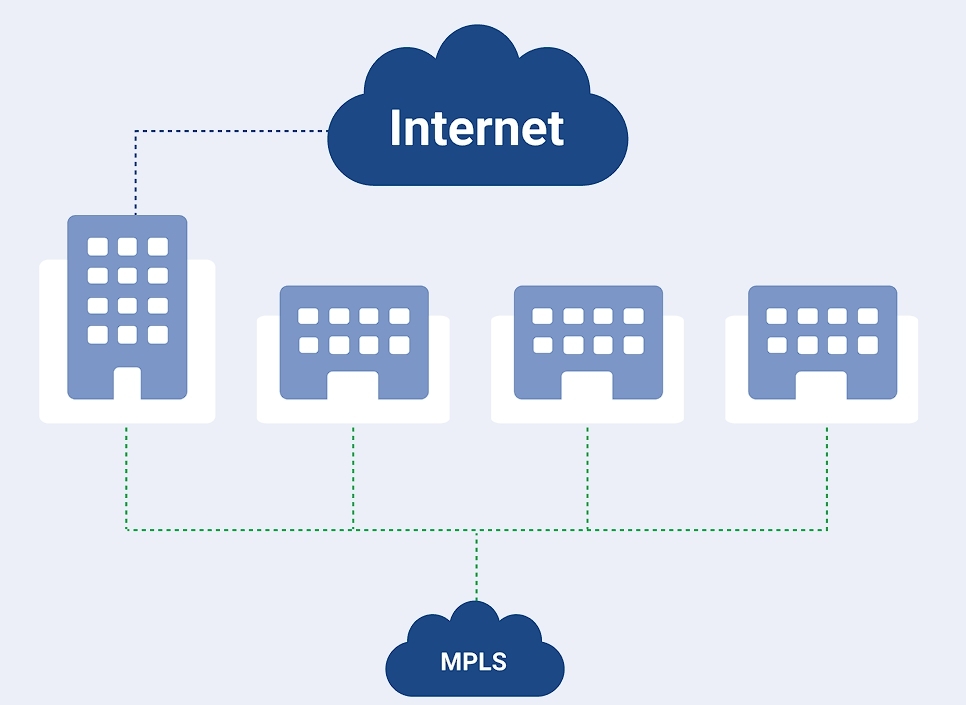If your network infrastructure is unreliable and safe enough to protect the data inside, you’ll face serious consequences. Two technologies that are commonly implemented to help secure digital assets are VPN and MPLS. They are well known by network admins thanks to their connection and data protection abilities. In this article, we will delve into the pros and cons of VPN and MPLS solutions and help you decide the better one for your network. Keep reading the article to determine which is the right choice for your business.
What is VPN?
VPN stands for Virtual Private Network. It is a cyber security technology that allows users to be more anonymous online, surf more privately, and protect themselves from malicious eyes who spy on their online activities. This technology creates a secure and encrypted connection between two devices, allowing remote users to access a private network from a remote location. Virtual Private Networks use a combination of encryption protocols and tunneling to provide a secure connection to block hackers from accessing a piece of sensitive information. Today, VPNs are mostly used to allow remote employees to access business resources or provide access to traveling employees when they need to work outside the office.
Pros of VPN
Security VPN solutions provide a high level of security for your network traffic. By encrypting all the communication between devices, VPNs render the data unreadable to any prying eyes and prevent data theft as much as possible. VPNs are a strong candidate for their security abilities for businesses that need to transmit sensitive data. Cost-effectiveness VPNs are relatively cost-effective compared to other network security technologies, especially MPLS. Virtual Private Networks utilize the existing network infrastructure and can be implemented on them. This means that they do not require any additional hardware or specialized software. They are easy to maintain and affordable to set up.
Cons of VPN
Reduced speed VPNs can slow down your internet speed due to added features such as encryption or routing overhead. This well-known issue is especially noticeable when you connect to a network from a very remote location, which VPNs are mostly used for. The chances are that you’ll experience high latency and longer ping times. Reliance on Internet Infrastructure VPN solutions rely on the Internet infrastructure, so that they can be subject to performance issues in the long run. The performance of the VPN connection is directly linked to the stability of the Internet. If the Internet connection is congested, the connection drops, and slower speeds will occur.
What is MPLS?
MPLS stands for Multiprotocol Label Switching. It is a network technology used to direct traffic in a private network using labels effectively. Within an MPLS system, each data set gets a label, which is then used to identify the data and direct them to their pre-destined paths. This labeling system reduces network congestion and improves overall performance. MPLS is a more traditional technology than VPN and is commonly used by larger networks. Since this is a dedicated network infrastructure, MPLS networks require specialized hardware or a service provider that offers MPLS connectivity.
Pros of MPLS
Speed MPLS is significantly faster than most VPN connections. This is because MPLS uses its own dedicated infrastructure, not shared with other users. By being a separate connection, MPLS is free from the performance of the Internet and can prioritize some sets of data to ensure they get to their destination quickly. Scalability MPLS networks are highly scalable and able to meet growing business needs. If you need to expand your network infrastructure, MPLS might be your choice. Although most VPN providers also offer great scalability, you can easily add new sites or additional bandwidth to MPLS networks.
Cons of MPLS
Cost MPLS networks are considerably more costly than VPN connections. This technology requires its own network infrastructure with a whole set of specialized hardware and software. That’s why MPLS is more common in larger enterprises; not all businesses can afford these requirements. Complexity VPN solutions are being used by individual users every day. They are easy to use and set up, and with the online providers offering their expertise, VPN is the simpler choice. MPLS networks, on the other hand, bring up challenges as they are complex to set up and maintain.
VPN vs. MPLS – Which One to Choose?
When choosing between VPN vs. MPLS, there are a few factors to consider, such as ease of use, cost-effectiveness, and network performance they’ll provide. First, if performance and highly reliable network infrastructure are a priority within an organization, MPLS might be the better choice for them. MPLS networks are designed to provide higher performance and improved network speed in exchange for higher costs. MPLS is a great choice if a network supports critical applications or transmits sensitive data. On the other hand, for businesses that need a more flexible and cost-effective security solution for their networks, VPN is clearly the winning choice. VPNs are more affordable than MPLS networks and usually more flexible. The number of devices that can be connected and the number of apps supported by the VPN offers great flexibility to any online business. The last factor to consider here is the level of technical knowledge to maintain these two technologies. VPNs are generally more user-friendly and require little to no technical knowledge. When you factor in the active client support of VPN providers, it becomes, even more, easier to manage and use. However, due to the hardware and software involved in MPLS networks, they are more complex, and the in-house IT teams may be unable to maintain such a system. Ultimately, the choice between MPLS and VPN will depend on various factors. But most importantly, it all boils down to an organization’s specific network and business needs.

